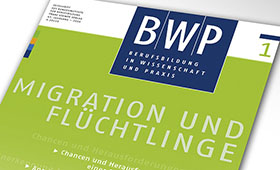Esser: “A systematic approach to qualification is essential”
The BIBB specialist journal “BWP” examines the topic of “Migration and Refugees”
06/2016 | Bonn, 09.02.2016

Following the initial humanitarian protection, the key areas in which efforts should be focussed to ensure integration of refugees with prospects of permanent residency in our society are education, training and qualification. This is underlined by BIBB President Friedrich Hubert Esser in the February issue of the Federal Institute for Vocational Education and Training's (BIBB) specialist journal “Vocational Training in Research and Practice - BWP” entitled “Migration and Refugees”. “A master plan outlining an agreed approach is required in order to manage the complexity associated with this,” explains Esser. “This is because the extent of commitment required to tackle this represents a major challenge - but doubtless one which can be dealt with by the vocational education and training system”. He added that key to this is reliable information about asylum seekers’ level of education and training, and qualification structure as well as the use of tried and tested instruments and institutions which already exist.
He also noted that, wherever possible, compatible procedures are necessary initially at a national level in order to determine the competences of refugees. This would then enable the right vocational integration strategies to be developed.
Esser argues that 3 factors in particular should be taken into account so that previous positive experiences with vocational education and training activities for people from a migration background can be used successfully in this case:
- Reliable general education, ideally with a qualification;
- Qualification processes with an individual focus wherever possible, and stable interpersonal re-lationships between learner and specialists employed in education, training and advice;
- Motivation and efficiency by means of practical learning in businesses or in inter-company edu-cation and competence centres.
Good examples from the Federal Government’s education chain and career orientation programme should also be used for the master plan for the education and training of refugees, together with expe-riences from the use of now proven instruments such as mentoring for the transition to the labour market, introductory qualifications, assisted education and training and external training management, as well as voluntary involvement through the senior expert service, for example.
In a range of articles, the current issue of the BIBB's specialist journal,“BWP”, examines the subject of “recognizing vocational qualifications of refugees – using the Prototyping Transfer example”, provides “an overview of the current legal position and of new regulations for funding instruments” for getting refugees into training. An interview with Prof. Dr. Christine Langenfeld, Chairwoman of the Expert Council of German Foundations on Integration and Migration is included which sets out her views on the “opportunities and challenges involved in the early integration of refugees".
Further information: BWP, Issue 1/2016. The full issue, for which there is a charge, can be ordered or downloaded at www.bibb.de/bwp-1-2016 (German only). The editorial by BIBB President Friedrich Hubert Esser and selected articles in English are available for download free of charge from https://www.bibb.de/veroeffentlichungen/en/bwp/show/id/7896.
Specimen copy requested if printed.